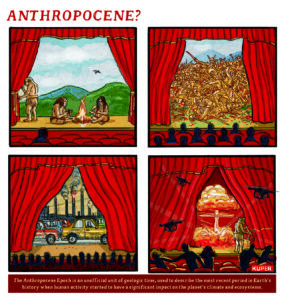Old Greek Plays Record Halcyon Days
History and literature provide evidence of consistently mild mid-winter weather in ancient Greece, helping climate scientists to reconstruct the past and so understand the future.
By Tim Radford, Climate News NetworkThis piece first appeared at Climate News Network.
LONDON — In fifth century Athens, in January at least, the skies were clear and the rain stayed away. The days, to use a classical reference, were halcyon.
Two Greek researchers have combed the great plays of Aeschylus, Sophocles and Euripides and the bawdy comedies of Aristophanes to deliver a long-term weather report for mid-winter days from 458 BC to 401 BC. They report in the Royal Meteorological Society’s journal Weather that, clearly, the city was a good place to hold open-air stage productions in mid-winter. Sophocles, in his masterpiece Oedipus at Colonus, actually says so:
“A distant music, pure and clear rises from green secluded vales. The constant trill of nightingales deep in their haunts of tangled vine, of sacred ivy, dark as wine, thick is the god’s inviolate wood; rich in berries and rich in fruit, the sun is curtained; the wind is mute, in winter.”
To understand the climate of the future, scientists must reconstruct the patterns of the past, long before the first formal weather records. They do this by examining pollens in lake beds, growth rings in ancient trees, ice cores and ocean muds to deliver circumstantial evidence of bygone seasons.
Balmy mid-winter
But there are also indirect references in human records: in naval log books, in medieval tax records, in monastic manuscripts, and in chronicles from Baghdad in the golden age of Islamic scholarship.
Christina Chronopoulou of the National and Kapodistrian University of Athens, and a colleague from Panteion University in the same city, decided to comb 43 surviving works performed during the Lenaia celebrations in mid-winter. They found seven clear direct and indirect references to the beneficial halcyon days of mid-winter.
The halcyon days are now a cliché but once referred to the myth of Alcyone, the grieving widow who was turned into a kingfisher by the gods, and who nested on the beach at midwinter.
But the fact the ancient Greeks routinely watched and expected to watch drama in open amphitheatres during the Attic month of Gamelion, which ran from 15 January to 15 February, provides indirect confirmation of good weather. Halcyon days, say the authors, are “atypical winter-time weather periods characterized by sunny and calm conditions” and the result of a stagnant high-pressure system that dominates the area at such a time of year.
Observant dramatists
And, as they worked through some of the great plays, they found enduring references to clear skies: in Agamemnon, by Aeschylus, in 458 BC a character spends his nights on the roof “to know thoroughly the throng of stars…” Aristophanes in The Birds in 414 BC describes a wedding. Attic weddings lasted for three days and were performed in the open air, another indicator of mellow conditions. The Birds also contains references to a “skiadeion”, a parasol, an umbrella to provide shade from the sun, rather than shelter from the rain.
Euripides in Medea in 431 BC mentions “the temperate and sweet breezes” while Aristophanes in The Frogs in 405 BC actually addresses “you halcyons who chatter by the ever-flowing waves.”
“Combining the fact that dramatic contests were held in mid-winter without any indication of postponement, and references from the drama about clear weather and mild winters, we can assume that those particular days of almost every January were summery in the 5th and maybe the 4th centuries BC,” said Dr Chronopoulou.
Your support matters…Independent journalism is under threat and overshadowed by heavily funded mainstream media.
You can help level the playing field. Become a member.
Your tax-deductible contribution keeps us digging beneath the headlines to give you thought-provoking, investigative reporting and analysis that unearths what's really happening- without compromise.
Give today to support our courageous, independent journalists.






You need to be a supporter to comment.
There are currently no responses to this article.
Be the first to respond.